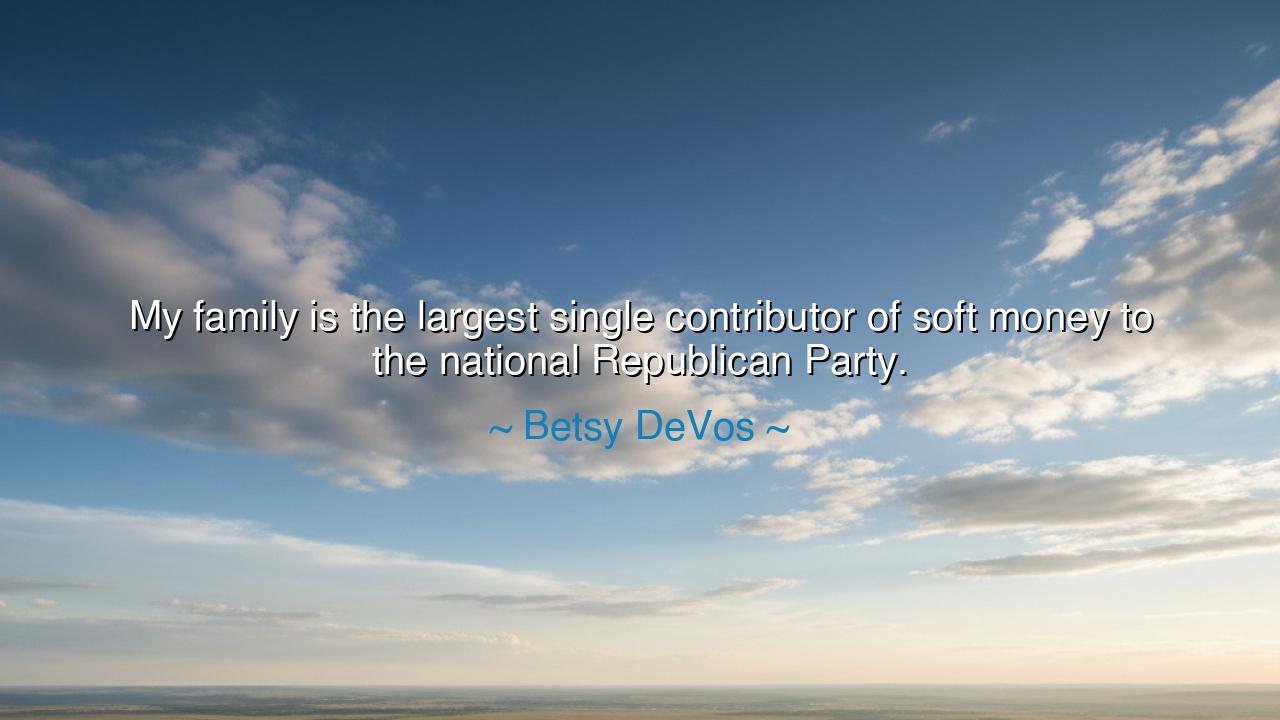
My family is the largest single contributor of soft money to the
My family is the largest single contributor of soft money to the national Republican Party.






Host: The room is still, with the soft light of the evening casting a gentle glow. Outside, the world continues at its usual pace, but inside, there’s a sense of anticipation. Jeeny sits at the table, her fingers resting lightly on the edge of a notebook, her expression thoughtful. Jack stands near the window, arms crossed, gazing at the street below.
Jeeny: (her voice gentle, yet with a hint of curiosity) “You ever think about the influence that money has in politics? How it can shape decisions, sway opinions, and even define the direction of entire movements?”
Jack: (glancing over at her, his voice dry, but intrigued) “Influence? Money has always played a huge role in politics, but I’m guessing you mean in terms of the kind of power it gives to people, right? It’s not just about donating—it’s about control.”
Jeeny: (nodding slowly, a small smile forming as she shares her thought) “Exactly. I was thinking about something Betsy DeVos said: ‘My family is the largest single contributor of soft money to the national Republican Party.’ It made me realize how much wealth can influence political systems, often in ways that the average person might not see or understand.”
Jack: (pauses for a moment, considering her words) “So, she’s saying that her family has a huge amount of power in shaping the Republican Party through financial influence? That their donations give them a seat at the table, so to speak?”
Jeeny: (smiling more deeply now, her eyes steady as she explains further) “Exactly. Soft money refers to unregulated donations made to political parties or organizations, and DeVos’ family is one of the largest contributors to the national Republican Party. This kind of financial influence allows them to shape party priorities, support candidates, and push policies that benefit them or their interests. It’s a clear example of how money doesn’t just fund campaigns—it shapes the political landscape itself.”
Host: Jeeny’s words settle in the room, the complexity of political influence and the power of money creating a subtle shift in the conversation. Jack stands still, his expression softening as he considers the deeper implications of how wealth can affect politics. The world outside continues its rhythm, but inside, the conversation feels rooted in something foundational about the relationship between money and power.
Jack: (his voice quieter now, almost reflective) “I see what you mean. It’s not just about donating to a cause or a candidate—it’s about the influence that money brings. It allows certain individuals or families to control the conversation, set the agenda, and make sure their interests are represented, often more than those of everyday people.”
Jeeny: (nodding, her voice calm, yet firm in its clarity) “Exactly. And it’s not just about having a voice—it’s about having the loudest voice. When you contribute millions of dollars, you can dictate the terms of the debate, shift the direction of a party, and make sure that your concerns are heard above everyone else’s. That’s what’s so dangerous about the influence of money in politics—it makes it harder for the average person to compete or even be heard.”
Jack: (pauses, his expression thoughtful as the idea sinks in) “It’s frustrating, isn’t it? That politics can be so heavily shaped by those with the most resources, while so many people who can’t afford to donate or lobby their interests get drowned out. It’s like we’re losing the true democratic nature of the system.”
Jeeny: (smiling softly, her voice gentle, but filled with quiet strength) “Yes. And that’s why it’s so important to be aware of this dynamic. Political influence shouldn’t be determined by how much money you can spend, but by the strength of your ideas and the support of the people. But as long as wealth continues to dominate the political process, it becomes harder for the system to reflect the true will of the people.”
Host: The room feels quieter now, the weight of their conversation settling into something deeper about the nature of money and power in politics. Jack turns from the window, his posture more relaxed, his thoughts clearly reflecting on the implications of financial influence in shaping the political landscape. Jeeny watches him, content in the knowledge that understanding these dynamics is the first step toward changing them. The world outside continues its rhythm, but inside, there’s a shared recognition that the true power in politics should lie with the people, not with those who can spend the most to sway it.






AAdministratorAdministrator
Welcome, honored guests. Please leave a comment, we will respond soon